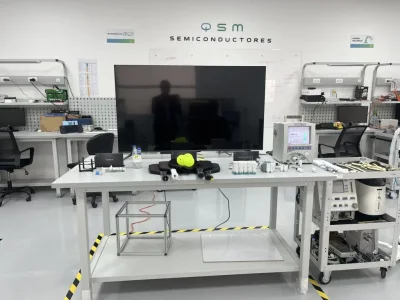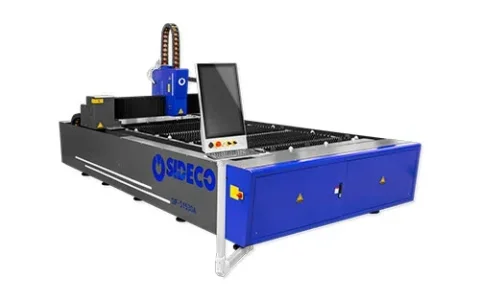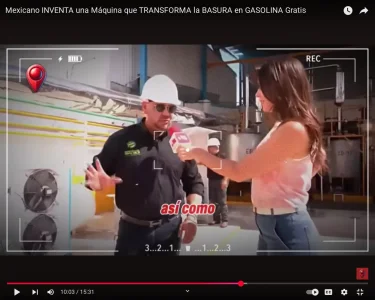QSM Semiconductores, a Mexican company seeking to accelerate the country's efforts to manufacture semiconductors in Mexico, presented to the Secretary of Economy, Marcelo Ebrard, the progress made toward achieving this goal. These include an agreement to acquire the manufacturing equipment in Europe that will comprise the chip plant, the cornerstone of which will be laid in the state of Querétaro in the first quarter of 2025.
During the presentation of the Master Plan for the Development of the Semiconductor Industry in Mexico 2024-2030 at the Ministry of Economy, organized by the Mexico-United States Semiconductor Collaboration Forum, Alejandro Franco, founding partner and Chairman of the Board of QSM, highlighted the importance of the agreement with Europe, as well as the operation of its Engineering Center (CEI) and Design Center (CEDI), both located in Querétaro.
The agreement will allow QSM to begin the equipment acquisition and integration phase of the Mexican plant for legacy node chip manufacturing. According to the company, this process will not only strengthen local talent but will also generate wealth for the country and highly skilled jobs in areas such as engineering, mechatronics, solid-state physics, and advanced electronics.
“With this, QSM Semiconductors is ready to contribute to boosting the semiconductor industry in Mexico. Our vision is focused on technological independence, strengthening local infrastructure, and creating a comprehensive ecosystem for semiconductor design and manufacturing,” Franco said.

Photo: QSM Semiconductors
Legacy node chips are semiconductors manufactured under established, but still developing, standards of 28 nanometers or larger. Although not as advanced as the chips used in smartphones, typically 5 nm or smaller, legacy chips still represent an important component of the value chain.
28nm chips are primarily used for critical functions in automobiles, airplanes, household appliances, broadband, consumer electronics, factory automation systems, medical devices, and even military systems. In that sense, they are still a relevant element for the advancement and digitalization of multiple industries.
“Having an advanced semiconductor industry is vital for Mexico to achieve the high levels of development to which we aspire; this is decisive. We must be successful together with the United States to resolve this,” said Ebrard.
Carlos Rebellón, coordinator of the Forum, explained at the meeting that the master plan consists of a set of public policies, cooperation measures, investments, and developments aimed at doubling investment, consumption, and domestic content in the industry and placing Mexico “among the elite of sophisticated economies.”
QSM Semiconductores, que busca acelerar los esfuerzos del país para fabricar semiconductores en México, presentó los avances para cumplir este objetivo.

dplnews.com
SEMICONDUCTORS — President Lula will sign a law providing incentives for domestic semiconductor production during the event. The law will allocate BRL 7 billion annually (totaling BRL 21 billion by 2026) to stimulate research and innovation in chip and electronics supply chains, with applications for solar panels, smartphones, personal computers and other Industry 4.0-related devices.
The new legislation introduces the Brazil Semicon program, reinforces the Semiconductor Industry Technological Development Support Program (Programa de Apoio ao Desenvolvimento Tecnológico da Indústria de Semicondutores /PADIS) and extends the Information and Communication Technology Law (Lei de Tecnologia da Informação e Comunicações/TIC). It also provides incentives for products developed using national technology (Tecnac) and higher credit rates for the North, Northeast and Central-West regions.
At the ceremony, Finep will announce the launch of BRL 4.5 billion in credit lines for the semiconductor sector. These funds will supplement the resources that FINEP, BNDES and the Brazilian Agency for Research and Industrial Innovation (Empresa Brasileira de Pesquisa e Inovação Industrial/EMBRAPII) have provided under the Plano Mais Produção (
More Production Plan) since last year.
SMART FACTORIES — Additionally, BNDES and Finep will announce the launch operations for the digital transformation of micro, small and medium-sized industrial businesses as part of the
Brasil Mais Produtivo program. An initial BRL 160 million will be allocated to smart factory development, with an additional BRL 400 million to formulate digitalization plans, resulting in a total investment of BRL 560 million.
The
Brasil Mais Produtivo program is a joint initiative of the Ministry of Development, Industry, Trade and Services (Ministério do Desenvolvimento, Indústria, Comércio e Serviços/MDIC), the Brazilian Micro and Small Business Support Service (Serviço Brasileiro de Apoio às Micro e Pequenas Empresas/Sebrae), the National Service for Industrial Training (Serviço Nacional de Aprendizagem Industrial/SENAI), BNDES, the Brazilian Agency For Industrial Development (Agência Brasileira de Desenvolvimento Industrial/ABDI), Finep and Embrapii. It aims to enhance the productivity of small and medium-sized enterprises (SMEs) by implementing lean manufacturing, energy efficiency and digital transformation initiatives.
Estimates indicate that at least 8,000 of the 200,000 participating companies will reach the "technological frontier" by the end of the process. This will be achieved through the installation of digital sensors on production lines, system integration via cloud computing and the use of Big Data, IoT (Internet of Things), 3D printing and artificial intelligence.
ENHANCED TARGETS — The objective of NIB Mission 4 is to facilitate the digital transformation of 50% of Brazilian industrial companies by 2033, with an intermediate target of 25% by 2026. This will result in a threefold increase in the proportion of national production in emerging and disruptive technologies. As of 2023, 18.9% of industries are digitized.
To achieve company digitalization, the implementation of at least three of the six technologies considered key for digital transformation is essential. These include cloud services, ERP/CRM systems, big data, service robots, the Internet of Things and artificial intelligence.
The program target, announced during the NIB launch in January, is for 90% of companies to be digitized by 2033, based on the assumption that most companies would adopt at least one of the six key technologies.
RESOURCES — Allocation of public funds to Mission 4 between 2023 and 2026 will be derived from the Plano Mais Produção, the
Brasil Mais Produtivo and other government initiatives, including the ICT Law, Padis and MCTI programs. Furthermore, the introduction of BNDES Development Credit Notes (Letra de Crédito do Desenvolvimento/LCDs) will contribute BRL 30 billion to the bank's efforts during this period, amounting to BRL 10 billion per year.
The LCDs were approved by the National Congress of Brazil in July and subsequently regulated by the National Monetary Council (Conselho Monetário Nacional/CMN) in August. These fixed-income securities, which were issued in the market, will exclusively finance NIB projects. One key advantage for buyers is the income tax exemption for individuals and a reduced corporate income tax rate from 25% to 15%.
PRIVATE INVESTMENTS — The total value of private investment announcements is estimated at BRL 85.7 billion, with scheduled implementation periods extending from 2024 to 2035. These investments encompass a range of initiatives, including infrastructure development, machinery acquisitions, research and development, the establishment of new production facilities and technological diversification. The announcements are set to be made by associations representing companies in the semiconductor and high-tech sectors, namely the Brazilian Electrical and Electronics Industry Association (Associação brasileira da indústria elétrica e eletrônica/ABINEE), the Brazilian Association of the Semiconductor Industry (Associação Brasileira da Indústria de Semicondutores/ABISEMI) and P&D Brasil, in collaboration with Amazon Web Services.
This brings the total amount of private sector investments announced since the beginning of the year to BRL 580.2 billion, encompassing a range of sectors, including automotive (BRL 130 billion), food (BRL 120 billion), pulp and paper (BRL 105 billion), steel (BRL 100 billion) and health (BRL 39.5 billion).
These investments are largely driven by the incentives offered by the NIB and related government programs, including the Green Mobility and Innovation (Mobilidade Verde e Inovação/Mover) and the Accelerated Depreciation (Depreciação Acelerada) programs, as well as the semiconductor and information and communication technology (TIC) law, which is scheduled to be signed today.
The country’s industrial restrengthening is evidence of the economic recovery begun in 2023, characterized by income redistribution, internal market growth, expansion of the Gross Domestic Product (GDP), balanced public finances, controlled inflation and the approval of pivotal investment frameworks in Brazil’s National Congress, including the fiscal framework and tax reform.
Initial investments to focus on fiber optic manufacturing, data center development, cloud computing, telecommunications, electromobility, software innovation and network infrastructure deployment

www.gov.br







